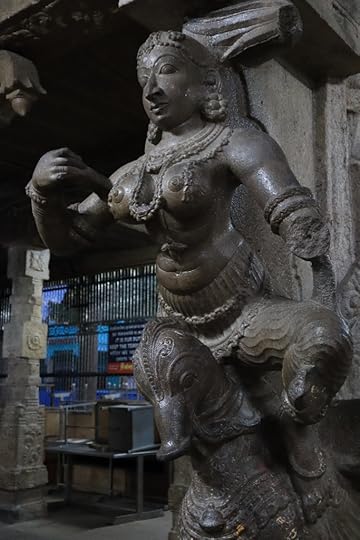Heat, Heat, and Heat: Reading Tamil in the Summer
I spent a whole month of one of my favourite summers in Tamil Nadu (barring a three-day furlough to the Travancore coast) and to much my delight I spent this month thinking of Tamil culture and peculiarly for this summer, also reading Tamil in Tamil. I owe much of this summer’s pleasures to my guru, Prof. Anandakumar, Head of Tamil Department at the Gandhigram Rural Institute who taught me not only how to read the Perunkatai which I intend to study partly and somewhat peripherally in my research. I also of course owe the delights of Tamil Nadu to my kilimol̤i (parrot-speech) and kuyilkural (cuckoo-voice) girlfriend who gave me company during part of my stay in Tamil Nadu and taught me how to be in Tamil. With her I bathed in Tamil music and dressed myself with Tamil cinema (sometimes grotesquely like with Thug Life). Here I just leave of a few excerpts of memories of reading Tamil. And this blog post is a hat-tip to my spiritual preceptor, Thiru David Shulman who wrote a whole memoir of his stay in Andhra titled Spring, Heat, Rains (2008).
-0-0-
Udayana and his entourage proceed to Rācakiri (Rājagṛha)
Marutam Tinai
The toilers on lines of paddy like a crowd
Descend into a pond
From which emerges a buffalo – rushing away
Combing apart bundles of leaves hanging atop shafts of sugarcane
Kissing wood apples
Wagging its tail, it
Steps on the most precious rice
And rubs itself against a lotus guarded by the green of paddy and
on slushy waters where flies had landed,
and with it also pushes a frog to leap into murkiness.
It sluggishly hovers around stacks of hay merged with the rice
where bees buzz without break
And sails under the vast shade of the areca tree
(Perunkatai, 3.2.14-20)

-0-0-
The bliss of traveling in Tamil Nadu has been hearing a song line that goes “Jannal vecha jacket podavaa kaatru adikku”
[Stitch me a bodice with a window so the wind can strike me]
-0-0-
Udayana suffers from separation from Vācavatattai:
As the white cloud breaks its form
And hosts a flash of lightning – that
glimmers with shine and letting off heat
The hero proceeds on the path, all the while
meditating on his beloved
On a short branch of a mast-wood tree, gently waiting
for his lover, a cuckoo bird flaps his wings
till the flavour of the flower becomes his plumage
and he forsakes his own form
His rosary pea-eyed lady-love seeks him too
but cannot make out his new facelift
and yearning to mate with him she flaps her wings and he –
makes himself heard with a call of pity
Till the two are paired and at ease
The hero – alone, alone is as if pierced by a lance made of iron
— picks up his lyre and with his lotus-like palms
begins playing
(Perunkatai, 3.6.7-19)

-0-0-
It took me a visit to Srivilliputhur and sitting at a mantapam between the Vaṭapatraśāyī temple and its gopuram to realise that Āṇḍāl all along was not just a poet-saint but a patron-saint; of all of us heritage-lovers, temple-goers, and museum-visitors. In nāyakanāi ninṟa, she speaks to a guard (kāppān-ae) of the koil to open the door, just as we all make pleas to the temple management, the priest, the ASI security guard, the museum curator. Each time, we appeal to their position (koḍi tonṟum toraṇam vāyil kappānae: guard below the gate flanked by tall flags) and ask them to open the doors (tāl tiravāy), or keep the doors opened longer, let us have a peek at a hidden shed of sculptures, and most importantly – take pictures! And each time we must elevate the value of what they have power over (maṇi kadavam – the door is no less than studded with precious jewels). And why should they open the doors? Look at us. So poor and little – emaciated, having come from so far just to see this (āyar ciṛu-miyarōmukku- us, the little cowherder girls). But no, no we are no ordinary people, as little as we may be. We are consumed by this place that we have come to – we are somehow very ‘pure!’ (tūyōmāy vandōm). The place speaks to us: we have sometime back made a covenant with the place and come with expectations. Just like Maṇivaṇṇa promised Āṇḍāl that he would give the girls drums to play (aṛai paṛai vāy nērndān) as he would sing (pāḍuvān) for them. The moment of love between the place and us should make the bureaucrat, this kāppān make an exception. We deserve it. Can he not listen to love? — We ask. Just like Āṇḍāl did!
-0-0-
 “Ātan“, one of the oldest surviving text fragments in South Asia. Keezhadi, 5th century BCE?
“Ātan“, one of the oldest surviving text fragments in South Asia. Keezhadi, 5th century BCE?-0-0-




